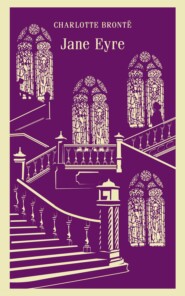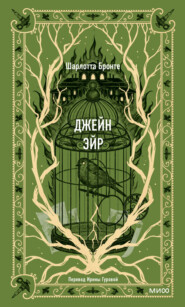По всем вопросам обращайтесь на: info@litportal.ru
(©) 2003-2025.
✖
Shirley
Настройки чтения
Размер шрифта
Высота строк
Поля
“Do you want a subscription to a new Ranter’s chapel, Mr. Barraclough? Unless your errand be something of that sort, I cannot see what you have to do with it.”
“I hadn’t that duty on my mind, sir; but as Providence has led ye to mention the subject, I’ll make it i’ my way to tak ony trifle ye may have to spare; the smallest contribution will be acceptable.”
With that he doffed his hat, and held it out as a begging-box, a brazen grin at the same time crossing his countenance.
“If I gave you sixpence you would drink it.”
Barraclough uplifted the palms of his hands and the whites of his eyes, evincing in the gesture a mere burlesque of hypocrisy.
“You seem a fine fellow,” said Moore, quite coolly and dryly; “you don’t care for showing me that you are a double-dyed hypocrite, that your trade is fraud. You expect indeed to make me laugh at the cleverness with which you play your coarsely farcical part, while at the same time you think you are deceiving the men behind you.”
Moses’ countenance lowered. He saw he had gone too far. He was going to answer, when the second leader, impatient of being hitherto kept in the background, stepped forward. This man did not look like a traitor, though he had an exceedingly self-confident and conceited air.
“Mr. Moore,” commenced he, speaking also in his throat and nose, and enunciating each word very slowly, as if with a view to giving his audience time to appreciate fully the uncommon elegance of the phraseology, “it might, perhaps, justly be said that reason rather than peace is our purpose. We come, in the first place, to request you to hear reason; and should you refuse, it is my duty to warn you, in very decided terms, that measures will be had resort to” (he meant recourse) “which will probably terminate in—in bringing you to a sense of the unwisdom, of the—the foolishness which seems to guide and guard your proceedings as a tradesman in this manufacturing part of the country. Hem! Sir, I would beg to allude that as a furriner, coming from a distant coast, another quarter and hemisphere of this globe, thrown, as I may say, a perfect outcast on these shores—the cliffs of Albion—you have not that understanding of huz and wer ways which might conduce to the benefit of the working-classes. If, to come at once to partic’lars, you’d consider to give up this here miln, and go without further protractions straight home to where you belong, it ‘ud happen be as well. I can see naught ageean such a plan.—What hev ye to say tull’t, lads?” turning round to the other members of the deputation, who responded unanimously, “Hear, hear!”
“Brayvo, Noah o’ Tim’s!” murmured Joe Scott, who stood behind Mr. Moore. “Moses’ll niver beat that. Cliffs o’ Albion, and t’ other hemisphere! My certy! Did ye come fro’ th’ Antarctic Zone, maister? Moses is dished.”
Moses, however, refused to be dished. He thought he would try again. Casting a somewhat ireful glance at “Noah o’ Tim’s,” he launched out in his turn; and now he spoke in a serious tone, relinquishing the sarcasm which he found had not answered.
“Or iver you set up the pole o’ your tent amang us, Mr. Moore, we lived i’ peace and quietness—yea, I may say, in all loving-kindness. I am not myself an aged person as yet, but I can remember as far back as maybe some twenty year, when hand-labour were encouraged and respected, and no mischief-maker had ventured to introduce these here machines which is so pernicious. Now, I’m not a cloth-dresser myself, but by trade a tailor. Howsiver, my heart is of a softish nature. I’m a very feeling man, and when I see my brethren oppressed, like my great namesake of old, I stand up for ’em; for which intent I this day speak with you face to face, and advises you to part wi’ your infernal machinery, and tak on more hands.”
“What if I don’t follow your advice, Mr. Barraclough?”
“The Looard pardon you! The Looard soften your heart, sir!”
“Are you in connection with the Wesleyans now, Mr. Barraclough?”
“Praise God! Bless His name! I’m a joined Methody!”
“Which in no respect prevents you from being at the same time a drunkard and a swindler. I saw you one night a week ago laid dead-drunk by the roadside, as I returned from Stilbro’ market; and while you preach peace, you make it the business of your life to stir up dissension. You no more sympathize with the poor who are in distress than you sympathize with me. You incite them to outrage for bad purposes of your own; so does the individual called Noah of Tim’s. You two are restless, meddling, impudent scoundrels, whose chief motive-principle is a selfish ambition, as dangerous as it is puerile. The persons behind you are some of them honest though misguided men; but you two I count altogether bad.”
Barraclough was going to speak.
“Silence! You have had your say, and now I will have mine. As to being dictated to by you, or any Jack, Jem, or Jonathan on earth, I shall not suffer it for a moment. You desire me to quit the country; you request me to part with my machinery. In case I refuse, you threaten me. I do refuse—point-blank! Here I stay, and by this mill I stand, and into it will I convey the best machinery inventors can furnish. What will you do? The utmost you can do—and this you will never dare to do—is to burn down my mill, destroy its contents, and shoot me. What then? Suppose that building was a ruin and I was a corpse—what then, you lads behind these two scamps? Would that stop invention or exhaust science? Not for the fraction of a second of time! Another and better gig-mill would rise on the ruins of this, and perhaps a more enterprising owner come in my place. Hear me! I’ll make my cloth as I please, and according to the best lights I have. In its manufacture I will employ what means I choose. Whoever, after hearing this, shall dare to interfere with me may just take the consequences. An example shall prove I’m in earnest.”
He whistled shrill and loud. Sugden, his staff and warrant, came on the scene.
Moore turned sharply to Barraclough. “You were at Stilbro’,” said he; “I have proof of that. You were on the moor, you wore a mask, you knocked down one of my men with your own hand—you! a preacher of the gospel!—Sugden, arrest him!”
Moses was captured. There was a cry and a rush to rescue, but the right hand which all this while had lain hidden in Moore’s breast, reappearing, held out a pistol.
“Both barrels are loaded,” said he. “I’m quite determined! Keep off!”
Stepping backwards, facing the foe as he went, he guarded his prey to the counting-house. He ordered Joe Scott to pass in with Sugden and the prisoner, and to bolt the door inside. For himself, he walked backwards and forwards along the front of the mill, looking meditatively on the ground, his hand hanging carelessly by his side, but still holding the pistol. The eleven remaining deputies watched him some time, talking under their breath to each other. At length one of them approached. This man looked very different from either of the two who had previously spoken; he was hard-favoured, but modest and manly-looking.
“I’ve not much faith i’ Moses Barraclough,” said he, “and I would speak a word to you myseln, Mr. Moore. It’s out o’ no ill-will that I’m here, for my part; it’s just to mak a effort to get things straightened, for they’re sorely a-crooked. Ye see we’re ill off—varry ill off; wer families is poor and pined. We’re thrown out o’ work wi’ these frames; we can get nought to do; we can earn nought. What is to be done? Mun we say, wisht! and lig us down and dee? Nay; I’ve no grand words at my tongue’s end, Mr. Moore, but I feel that it wad be a low principle for a reasonable man to starve to death like a dumb cratur. I willn’t do’t. I’m not for shedding blood: I’d neither kill a man nor hurt a man; and I’m not for pulling down mills and breaking machines—for, as ye say, that way o’ going on’ll niver stop invention; but I’ll talk—I’ll mak as big a din as ever I can. Invention may be all right, but I know it isn’t right for poor folks to starve. Them that governs mun find a way to help us; they mun make fresh orderations. Ye’ll say that’s hard to do. So mich louder mun we shout out then, for so much slacker will t’ Parliament-men be to set on to a tough job.”
“Worry the Parliament-men as much as you please,” said Moore; “but to worry the mill-owners is absurd, and I for one won’t stand it.”
“Ye’re a raight hard un!” returned the workman. “Willn’t ye gie us a bit o’ time? Willn’t ye consent to mak your changes rather more slowly?”
“Am I the whole body of clothiers in Yorkshire? Answer me that.”
“Ye’re yourseln.”
“And only myself. And if I stopped by the way an instant, while others are rushing on, I should be trodden down. If I did as you wish me to do, I should be bankrupt in a month; and would my bankruptcy put bread into your hungry children’s mouths? William Farren, neither to your dictation nor to that of any other will I submit. Talk to me no more about machinery. I will have my own way. I shall get new frames in to-morrow. If you broke these, I would still get more. I’ll never give in.”
Here the mill-bell rang twelve o’clock. It was the dinner-hour. Moore abruptly turned from the deputation and re-entered his counting-house.
His last words had left a bad, harsh impression; he, at least, had “failed in the disposing of a chance he was lord of.” By speaking kindly to William Farren—who was a very honest man, without envy or hatred of those more happily circumstanced than himself, thinking it no hardship and no injustice to be forced to live by labour, disposed to be honourably content if he could but get work to do—Moore might have made a friend. It seemed wonderful how he could turn from such a man without a conciliatory or a sympathizing expression. The poor fellow’s face looked haggard with want; he had the aspect of a man who had not known what it was to live in comfort and plenty for weeks, perhaps months, past, and yet there was no ferocity, no malignity in his countenance; it was worn, dejected, austere, but still patient. How could Moore leave him thus, with the words, “I’ll never give in,” and not a whisper of good-will, or hope, or aid?
Farren, as he went home to his cottage—once, in better times, a decent, clean, pleasant place, but now, though still clean, very dreary, because so poor—asked himself this question. He concluded that the foreign mill-owner was a selfish, an unfeeling, and, he thought, too, a foolish man. It appeared to him that emigration, had he only the means to emigrate, would be preferable to service under such a master. He felt much cast down—almost hopeless.
On his entrance his wife served out, in orderly sort, such dinner as she had to give him and the bairns. It was only porridge, and too little of that. Some of the younger children asked for more when they had done their portion—an application which disturbed William much. While his wife quieted them as well as she could, he left his seat and went to the door. He whistled a cheery stave, which did not, however, prevent a broad drop or two (much more like the “first of a thunder-shower” than those which oozed from the wound of the gladiator) from gathering on the lids of his gray eyes, and plashing thence to the threshold. He cleared his vision with his sleeve, and the melting mood over, a very stern one followed.
He still stood brooding in silence, when a gentleman in black came up—a clergyman, it might be seen at once, but neither Helstone, nor Malone, nor Donne, nor Sweeting. He might be forty years old; he was plain-looking, dark-complexioned, and already rather gray-haired. He stooped a little in walking. His countenance, as he came on, wore an abstracted and somewhat doleful air; but in approaching Farren he looked up, and then a hearty expression illuminated the preoccupied, serious face.
“Is it you, William? How are you?” he asked.
“Middling, Mr. Hall. How are ye? Will ye step in and rest ye?”
Mr. Hall, whose name the reader has seen mentioned before (and who, indeed, was vicar of Nunnely, of which parish Farren was a native, and from whence he had removed but three years ago to reside in Briarfield, for the convenience of being near Hollow’s Mill, where he had obtained work), entered the cottage, and having greeted the good-wife and the children, sat down. He proceeded to talk very cheerfully about the length of time that had elapsed since the family quitted his parish, the changes which had occurred since; he answered questions touching his sister Margaret, who was inquired after with much interest; he asked questions in his turn, and at last, glancing hastily and anxiously round through his spectacles (he wore spectacles, for he was short-sighted) at the bare room, and at the meagre and wan faces of the circle about him—for the children had come round his knee, and the father and mother stood before him—he said abruptly,—
“And how are you all? How do you get on?”
Mr. Hall, be it remarked, though an accomplished scholar, not only spoke with a strong northern accent, but, on occasion, used freely north-country expressions.
“We get on poorly,” said William; “we’re all out of work. I’ve selled most o’ t’ household stuff, as ye may see; and what we’re to do next, God knows.”
“Has Mr. Moore turned you off?”
“He has turned us off; and I’ve sich an opinion of him now that I think if he’d tak me on again to-morrow I wouldn’t work for him.”
“It is not like you to say so, William.”
“I know it isn’t; but I’m getting different to mysel’; I feel I am changing. I wadn’t heed if t’ bairns and t’ wife had enough to live on; but they’re pinched—they’re pined—”
“Well, my lad, and so are you; I see you are. These are grievous times; I see suffering wherever I turn. William, sit down. Grace, sit down. Let us talk it over.”
And in order the better to talk it over, Mr. Hall lifted the least of the children on to his knee, and placed his hand on the head of the next least; but when the small things began to chatter to him he bade them “Whisht!” and fixing his eyes on the grate, he regarded the handful of embers which burned there very gravely.
“Sad times,” he said, “and they last long. It is the will of God. His will be done. But He tries us to the utmost.”
Again he reflected.
“You’ve no money, William, and you’ve nothing you could sell to raise a small sum?”
“No. I’ve selled t’ chest o’ drawers, and t’ clock, and t’ bit of a mahogany stand, and t’ wife’s bonny tea-tray and set o’ cheeney ’at she brought for a portion when we were wed.”

















